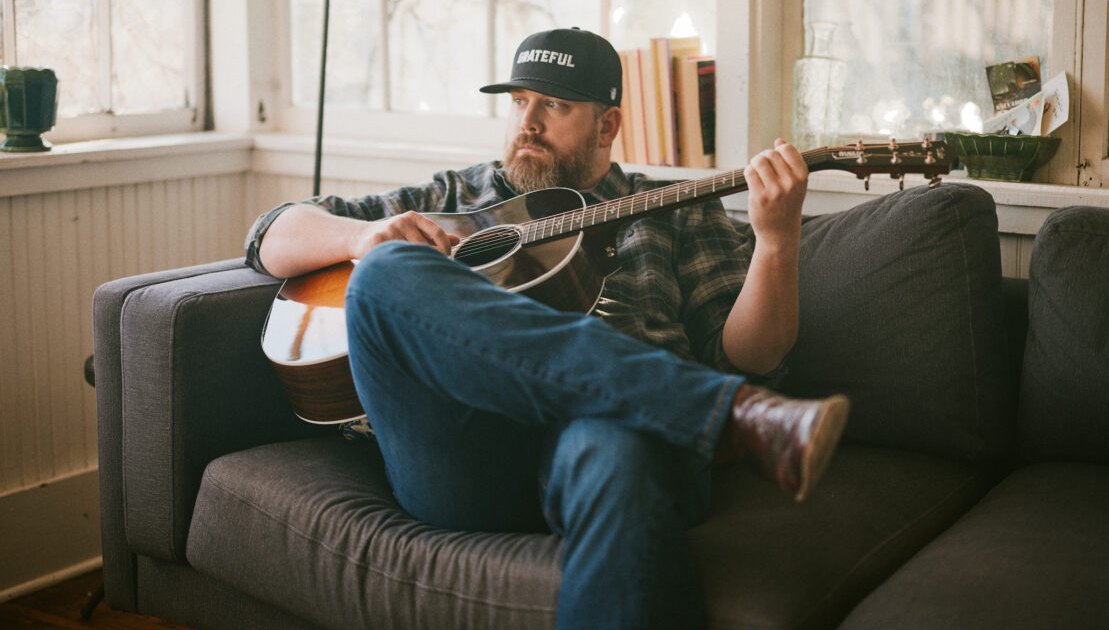Scotty Hasting has survived 10 bullets at point-blank range as an Army officer in Afghanistan, so it would seem safe to assume that nearly every challenge thrown in front of him today as a musician would pale in comparison—even singing on Nashville’s grandest stage.
It’s not to say that Hasting doesn’t still get a bit of the nerves when his name is called to perform the Grand Ole Opry. After all, his 2024 performance came less than five years after learning how to play guitar. At the same time he had to retrain his body to work as a left-hander, the result of the bullets shredding the nerves that helped his right hand function.
“I think when you get nervous it just means you care,” Hasting explains. “I’ve been shot at. I used to live in a world where I’d get shot at all the time. So yes, I may get nervous, but not enough to ever stop me from going out.”
Each morning Hasting wakes up and has the privilege to work on his newfound art is a win—a gift that wasn’t guaranteed after being shot 10 times while on routine duty in Kandahar in April 2011. Today, the Purple Heart recipient is now collecting other W’s—“Wow” moments—during this improbable career turn to country music.
What began at a Tennessee open mic in front of just four people and has since taken him to not only the Opry but to Normandy, France during D-Day commemorations and the West Lawn during this past year’s Memorial Day celebrations.
“Every time I’m on a stage, I’m like, how am I here?” he admits. “From the Opry to the West Lawn during Memorial Day—that was insane. There have just been so many moments where I’m like, how am I here? It’s been full of huge moments.”
Soon, the music world is sure to catch on to this breakout artist and his unique blend of country music. His work has been inspired by what he has seen and survived during war as well as the mental health struggles that follow him and most veterans who return home.
His latest song, “Scars,” dropped earlier this month, reflects on those moments and how he constantly works to come out stronger and thriving.
“I started music as therapy for me,” he says. “I never thought in a million years that this would become a career, or that it would be where it is now.”
To say a music career was the plan all along would be a stretch, Hasting admits. Learning to play guitar—while having no feeling in his right hand—started as physical rehabilitation during COVID. It’s then blossomed into a therapeutic treatment to stay occupied in order to alleviate the stress that comes with PTSD—something he says he still struggles with.
And while Hasting’s rise in Nashville has become a second-chance-in-life dream come true, the Cincinnati native’s quest to improve his physical and mental health—both in the gym and recording studio—is going to be a lifelong affair. At the same time, his new platform allows him to spread the message of hope and purpose among fellow former servicemembers struggling.
For Scotty Hasting, it’s always been about leaving no one behind.
“I was playing six nights a week for four hours at a time,” Hasting says. “For those four hours, the PTSD, the depression, the anxiety—it was all gone, and I lived for it. To this day, when I’m onstage, it’s like therapy happening right there. It’s incredible. Now I have a platform to help others find what I was able to find.”

Scotty Hasting’s Price for Country Music Success: 10 Bullets
As a country music artist, Scotty Hasting admits he’s not quite yet a household name among country music fans.. Still, he’s enjoying every minute of the ride since being signed by Black River Records in October 2023. His ascension in the Music City still oftentimes leaves him shaking his head in disbelief at how far his name has traveled in country music circles in such a short time.
“I was actually talking to someone the other day, and they said, ‘Oh yeah, Garth Brooks was talking about you the other day,’” he recalls. “I was like, what? Hold on a second. Garth Brooks was talking about ME the other day? Let’s just take a moment to think about what you just said.”
In a way, there may not be a Scotty Hasting the country artist without April 21, 2011, when he was known as U.S. Army Sergeant Scott Hasting. On that day, as he explained on a recent podcast, he and his team set out on a routine patrol mission in Kandahar—an assignment he took with great pride each day. The squad noticed an older man wandering back and forth, watching their movements. At first, nothing seemed out of the ordinary. However, red flags went up when the local continued to circle back. Within seconds, Hasting and his team were ambushed. A gunman, standing just 12 feet away, opened fire—making it impossible to avoid being hit.
He was struck 10 times: five times in the brachial plexus (the nerves running through the shoulders) and four that took out a chunk of his hip. The final shot went clean through his leg. Two bullets struck Hasting’s body armor, which perhaps saved his life, leaving him with several massive bruises.
With his status in question during a three-day transport from the battlefield to Walter Reed Hospital, Hasting’s main goal was still to get back to Afghanistan and be side by side with his squad. “After I got shot, there was no question that I needed to return to Afghanistan to be with my guys,” he says. “It was just trying to figure out how to get back in the shape I needed to be in—back in army shape.”
The only problem was, as bandages hid the true extent of the damage, Hasting didn’t fully grasp the severity of his injuries until he tried taking his first step out of bed. “The doctors were like, ‘Do you want to walk?’ And I was like, ‘Yeah, I’m ready to get out of this hospital bed,’” he recalls. “Once I got to do that, I went to stand up and walk—and my leg just didn’t move. So I had to relearn how to do all that. It was crazy. It was very hard.”
He spent nine months at Walter Reed, including one month as an inpatient and seven more as an outpatient. “Instead of them coming to me, I was going to them,” he says. “But it was every day—something different, whether going in for more surgery or working with PT or occupational therapy. It was something every single day.”
The Unlikely Healing of Scotty Hasting Through Music and Archery
While learning to walk again would seem challenging, Scotty Hasting insists that portion of his rehab was no where near as challenging as was the process of rewiring himself to do everything left-handed. For an ex-power-hitting high school first baseman, having to now bat and throw—and everything else—from the opposite side took a tremendous amount of time-consuming effort.
“I’m naturally right-handed, and I had to learn how to do everything left-handed,” he says. “So the hardest thing for me was learning how to write left-handed, throw left-handed—how to truly do everything left-handed. That was the biggest hurdle I had, other than the fact that I had all these holes in me.”
His family played a major role in his recovery, especially his brother Corey, a former offensive lineman for Ohio University who spent time with the Cincinnati Bengals. “He and I have always been super competitive,” Hasting says. “We always tried to one-up each other, so it’s been great having him around because he’s always pushing me to do more.”
Also invaluable were his fellow servicemembers at Walter Reed, each facing their own recovery struggles. Just like on the battlefield, the soldiers had each other’s backs in the therapy room. “We would all see each other at occupational therapy and physical therapy, and we would always try to push each other to get to the next level,” he says. “They pushed you to be better than you were yesterday. And that really helped with my transition from the injuries.”
To help adapt to life as a lefty following his discharge in 2016, the military suggested participating in adaptive sports to aid in his rehab. Hasting chose archery and became quite skilled. “I lived for shooting archery to the point where I eventually got recruited by the U.S. Paralympic Committee. I was traveling all over the country, shooting for the U.S. Paralympic program.”
Shooting arrows became more than just a way to recapture some of his athletic competitiveness. Archery became an invaluable emotional outlet. As long as he stayed active, the PTSD he suffered from would subside for that period of time. “I really found a purpose and I found therapy in archery,” he says.
However, when COVID hit in 2020, archery came to a halt. Needing a new outlet, Hasting turned to music. “My therapy was taken away from me, and I needed something to get out of my head. I had a guitar in my room, and one day during COVID, I decided I was going to learn how to play it. I jumped on YouTube and started learning.”
What began as a simple curiosity soon blossomed into a full-blown obsession. Hasting quickly discovered the emotional power of turning feelings into music. Guitar practice then evolved into a lengthy songwriting study course. “That was my therapy, that was my escape,” he says. “And that’s what I did every day for, like, eight hours at a time.”

From Open Mic to Original Music
Hasting says it took several months watching YouTube tutorials and practicing how to press each chord with his still-developing left hand before he became comfortable with the guitar. He also had to learn to It took just one open mic night—at Cookeville’s Red Silo Brewing Company—for him to realize he was all in on music. “There were four people in the room. If they think I’m terrible, I don’t ever have to see those four people ever again.”
He played the first song he learned—Toby Keith’s “Should’ve Been a Cowboy.”
Since then, his determination has not only led to securing a record deal with Black River, but he’s also gone on to collaborate with country legends Lee Brice and Dolly Parton on an emotionally charged remake of the Trace Adkins hit “Til The Last Shot’s Fired.”
Now, Scotty Hasting is focusing on making his own original tracks, such as “Scars.” Like with guitar, he taught himself the building blocks of songwriting through instructional videos. The artistic process became another therapeutic outlet for Hasting to manage his PTSD.
“Being able to take those emotions and those feelings and put them somewhere else… being able to take them out of myself and put them on a piece of paper in song form, it changed everything, and it changed it so drastically, to the point that it truly saved my life.”
Not every songwriting session goes smoothly, he says. He admits it’s not always easy to dig deep and recall some of those traumatic events, but it gets somewhat easier with experience.
“It’s sometimes hard for me to capture or trigger the emotions that I’m trying to when I’m in a room of people I don’t know,” he says. “Sometimes it takes time, and sometimes you’re just feeling a certain way on a day, and just write that. And it really all depends. I walk into every room that I’m writing in and just try to write whatever’s in that room that day—whether it be sad, happy, whatever.”
Take Care of What You Can Control
What Scotty Hasting does have control over now is his health. After all, looking and feeling good while performing onstage all over the world is a priority. But at one point, Hasting’s weight hovered over 300 pounds. Having come this far, this quickly, he was determined not to sabotage the progress he worked for by being careless with his fitness habits.
“I just looked at myself, and I was like, I can’t do this,” he says. “I have to figure this out, especially with being on stage. You can get very winded very quickly when you’re heavier.”
He sticks to a carnivore diet as much as possible. Plenty of red meat, along with some fruits and vegetables, make up the majority of his meals, which has helped the 6’4” singer lose more than 40 pounds.
For exercise, he hits the weight room as much as he can. His training is somewhat limited due to physical restrictions, but his goal now is simply to stay as active as possible.
“I have to do something active every day,” he says. “I have to do something, especially with being on a stage and playing an hour-long show where you’re running around and jumping and really into it. You have to stay somewhat fit, cardio-wise. And, yeah, that’s all I try to do—just try to stay moving.”
Despite learning guitar remarkably quickly, Hasting knows his injuries will always limit his abilities. Simple things like holding a guitar pick in his right hand can’t be taken for granted. “I see my guitar players shred on the guitar, and I’m like, man, I wish I could do that,” he says. “But I can’t control this hand enough to be able to do that.”
From singing his song “Red, White and Blue” at the National Memorial Day Concert to traveling to Normandy to sing for WWII veterans on the 80th anniversary of D-Day, Hasting’s journey has been extraordinary. And still gets a bit of the nerves every time he enters the Grand Ole Opry.
“Some places are are more more nerve-wracking than others, like the Grand Ole Opry,” he says. “Every time you’re about to go on the Grand Ole Opry, there’s just the history and it hits you all at once. You get incredibly nervous very quickly because every performance for me is going to be the best performance that I can try to put on. ”
No matter how big he gets, Hasting hopes his story of second chances and finding purpose resonates with veterans. With more than 17 veterans committing suicide each day, he wants to use his platform to motivate others to find their own purpose. The. key, he says, is to find an outlet, anything, that can help eliminate the stress that comes with the silence.
“I’m hoping that when I’m on these stages, a veteran or someone who was hit or hurt would hear my story and think, ‘Damn, if he can do that, I can too,’” Scotty Hasting says. “That’s all I’ve ever hoped anyone sees when I’m on stage.”









